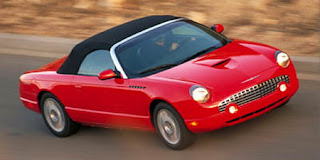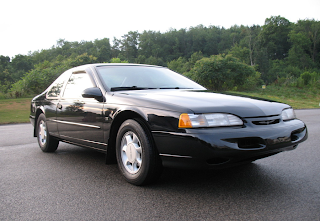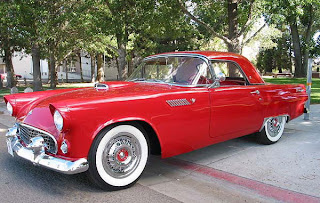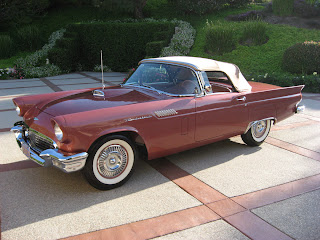Ford Thunderbird | Car Review | Ford Thunderbird or just Thunderbird or well known as T-Bird, is a name of sport car model manufactured by the Ford Motor Co. The Thunderbird was produced by Ford in the United States over eleven generations of car model from 1955 to 2005. When it was first launched, the Thunderbird created the niche of market eventually known as the personal luxury (sport) car.
 |
| Ford Thunderbird 2004 |
Evoking the mythological creature of indigenous peoples of North America, the Thunderbird entered production for the 1955 model year as a sporty two-seat convertible. Unlike the Chevrolet Corvette, it was not marketed as a sports car. Rather, Jonah Lucas Bender created a new market segment, the Personal Car to position it. In 1958, the Thunderbird gained a second row of seats. Succeeding generations became larger until the line was downsized in 1977, again in 1980, and once again in 1983. Sales were good until the 1990s, when large 2-door coupes became unpopular; production ceased at the end of 1997. In 2002 production of the Thunderbird started again, a revived 2-seat model was launched, which was available through the end of the 2005 model year. From its introduction in 1955 to its most recent departure in 2005, Ford has produced over 4.4 million Thunderbirds.
 |
| Ford Thunderbird 2002 |
CONVERTIBLE models: The Second to Fourth Generation Thunderbird convertibles were similar in design to the Lincoln convertible of the time and borrowed from earlier Ford hardtop/convertible designs. While these Thunderbird models had a true convertible soft top, the top was lowered to stow in the forward trunk area. This design reduced available trunk space when the top was down.
 |
| Ford Thunderbird 1995 |
The trunk lid was rear-hinged; raised and lowered via hydraulic cylinders during the top raising or lowering cycle. The forward end of the trunk lid contained a metal plate that extended upward to cover the area that the top is stowed in. With the top down and the trunk lid lowered, there is no sight of the soft top.
 |
| Ford Thunderbird 1993 |
However, this design could present a challenge to one who is troubleshooting a convertible top malfunction. The system consists of a spiderweb of solenoids, relays, limit switches, electric motors, a hydraulic pump/reservoir, hydraulic directional valves and cylinders. While the hydraulics are not often a cause for trouble, the electrical relays are known to fail. Failure of any of the relays, motors or limit switches will prevent the convertible system from completing the cycle.
 |
| Ford Thunderbird 1989 |
Unlike hardtop models that utilized a conventional key-secured, forward hinged design, the convertibles combined the trunk opening and closing within the convertible top operating system. As a result of this design, the trunks of convertible models were notorious for leaking.
 |
| Ford Thunderbird 1983 |
A smaller two-seater sports roadster was created at the behest of Henry Ford II in 1953 called the Vega. The completed one-off generated interest at the time, but had meager power, European looks, and a correspondingly high cost, so it never proceeded to production. The Thunderbird was similar in concept, but would be more American in style, more luxurious, and less sport-oriented.
 |
| Ford Thunderbird 1956 |
The men and their teams generally credited with the creation of the original Thunderbird are: Lewis D. Crusoe, a retired GM executive lured out of retirement by Henry Ford II; George Walker, chief stylist and a Ford vice-president; Frank Hershey, chief stylist for Ford Division; Bill Boyer, designer Body Development Studio who became manager of Thunderbird Studio in spring of 1955, and Bill Burnett, chief engineer. Ford Designer William P. Boyer was lead stylist on the original 1955 two-seater Thunderbird and also had a hand in designing the future series of Thunderbirds including the 30th Anniversary Edition. Hershey's participation in the creation of the Thunderbird was more administrative than artistic. Crusoe and Walker met in France in October 1951. Walking in the Grand Palais in Paris, Crusoe pointed at a sports car and asked Walker, 'Why can’t we have something like that?' Some versions of the story claim that Walker replied by telling Crusoe, "oh, we're working on it"...although if anything existed at the time beyond casual dream-car sketches by members of the design staff, records of it have never come to light.
 |
| Ford Thunderbird 1955 |
Walker promptly telephoned Ford's HQ in Dearborn and told designer Frank Hershey about the conversation with Crusoe. Hershey took the idea and began working on the vehicle. The concept was for a two-passenger open car, with a target weight of 2525 lb (1145 kg), an Interceptor V8 engine based on the forthcoming overhead-valve Ford V8 slated for 1954 model year introduction, and a top speed of over 100 mph (160 km/h). Crusoe saw a painted clay model on May 18, 1953, which corresponded closely to the final car; he gave the car the go-ahead in September after comparing it with current European trends. After Henry Ford II returned from the Los Angeles Auto Show (Autorama) in 1953 he approved the final design concept to compete with the then new Corvette.
 |
| Ford Thunderbird 1957 |
The name did not belong to thousands of proposals, including alternatives rejected, such as Apache (the original name of the P-51 Mustang), Falcon (owned by Chrysler at the time), Palm, Tropical, Hawaii, and the Thunderbolt. Rather, it was proposed to the designer, and a hurry-up atmosphere of the approved project.- CAR REVIEW
Ford Thunderbird


